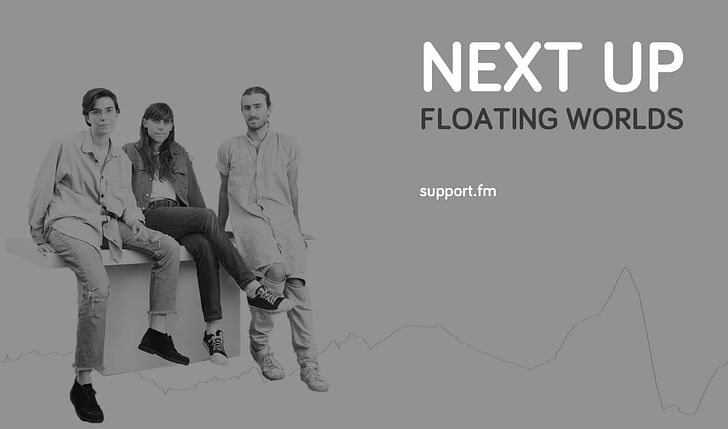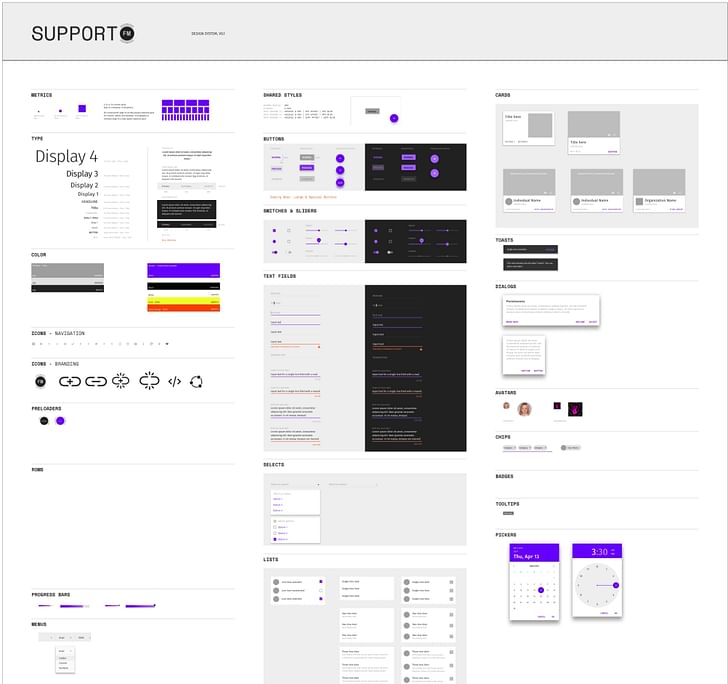

“Support.fm is necessary because we have an unjust bail system that keeps people in prison and detention for up to years at a time before ever seeing trial,” says Blaine O’Neill, one-third of Support.fm, a crowdfunding tool to support, in particular, trans and gender nonconforming (GNC) people in jail, prison and detention. Comprising O’Neill, Rye Skelton and Grace Dunham, Support.fm is a platform that uses design and new technologies to securely and anonymously connect a network of supporters to grassroots, trans and GNC led organizations that run community bail funds. We talked with them as part of Archinect’s live podcasting event Next Up: Floating Worlds.
In part due to factors like a lack of employment and housing opportunities, many trans and GNC people depend on sex and drug trades for their survival, which puts them at greater risk for incarceration than average. In fact, incarceration rates for trans and GNC people are four times higher than the national average, and even higher for trans and GNC people of color—more than 60% of queer, trans and GNC youth arrested each year are Black and/or Latinx. Many of the same factors that put trans and GNC people at risk, including rejection from their families, make it incredibly hard, if not impossible, for them to secure cash bail.
incarceration rates for trans and GNC people are four times higher than the national average
As Support.fm notes, these factors couple with existing difficulties built into the cash bail system. “People who are being harmed by the prison system are forced to do these seemingly very outdated actions like show up in person, wait four hours and pay bail in cash, even though the prison system obviously has the technology to make this a more efficient system,” states Dunham. Meanwhile, existing crowd-funding platforms like Kickstarter and GoFundMe have rules against using their services to raise money for bail and bond.
For Support.fm, their work inherently involves design. On one level, they are working against a system designed to be almost impossible to navigate for the people who are most at-risk from its violences. And alongside making legible these intentionally obfuscated bureaucracies, they also have to describe the broader geography of the prison-industrial complex. That’s because, in order to fund their project, they need to convince people to move money—namely, people whose racial and class-based privilege means they’re largely unaware of the realities of the contemporary American prison and detainment systems. And then, in order to make the platform itself work, Support.fm has to at once make things visible—their success stories, the organizations they partner with—and keep things hidden—the transactions behind the work, the identity of the people who they’re helping to get bail.

In our interview with Support.fm, which is available here, we discuss both their project and its context, with a particular focus on its spatial dimensions. Check out some selected excerpts below.
On why the project is needed:
“People who have yet to face trial and yet to be found guilty are spending years at a time detained in really difficult and violent conditions.”
“Getting people out of jail and detention via raising bail is a small form of harm reduction that’s an immediate way of getting people out of these really violent spaces, which are jails, prisons and detentions.”
“This work is already being done, and the way that we structured the project is we’re teaming up with other partner organizations that are already struggling to make bail for trans and GNC people, so we see ourselves as particularly [able] to create this more centralized platform to both publicize the pre-existing efforts of these groups and the amazing work they’re dong bailing people out, and also to generate new bail funds.”We’re trying to figure out the best way to create an anonymized transaction service without totally obscuring the work that we’re trying to facilitate
On anonymizing the platform:
“We’re trying to figure out the best way to create an anonymized transaction service without totally obscuring the work that we’re trying to facilitate.”
“There are two questions we’re trying to answer: one is how do we provide a secure platform where we anonymize the transactions that we’re facilitating. The reason why we want to do that is because we want to create a zero-knowledge system where, in the case of an external party, whether it be the state or other actors, getting access to our information, we’re creating all of this infrastructure for the benefit and success of the organizations. So we’re doing everything we can not to jeopardize their safety and their privacy… The other question is: how do we centralize, monitor, and analyze not just the capital that we’re moving but also the stories and the successes that we’re trying to facilitate. How do we record our activities in a matrix of success that we can then use to inspire other organizations to start bail funds and also to inspire our donors to continue to be supportive, involved stakeholders in the project.”

On the spatial dimensions of the prison-industrial complex:
“It feels arbitrary to focus on even specific aspects of the landscape and the geography of the prison-industrial complex because it’s completely constant and all around us and people’s awareness of it is just dependent on class and race-based proximity to it. For some people, it’s a mediating factor of life from day one, and for some people, it’s out of sight out of mind.”
“I do think that for the purposes of support.fm it’s important to think about the way that the state has a monopoly on architecture and technology and design when it comes to the prison-industrial complex.”
“The prison system is highly technologized. The infrastructure is very digital; increasingly, maximum-security prisons are run digitally. But then, on the other end of it, people who are being harmed by the prison system are forced to do these seemingly very outdated actions like show up in person, wait four hours and pay bail in cash, even though the prison system obviously has the technology to make this a more efficient system. So efficiency is also a place where we see violence being enacted. Who gets to make things simplified and easier to manage? And then, who bears the brunt of what I would call bureaucratic violence?”
“The prison crisis doesn’t stop at the limits of the United States of America or this continent. It’s a trans-national issue.”We’re coming to the table and trying to figure out how we can best design the tools for this work that’s already being done
On issues around visibility:
“Visibility is a relative concept. It’s not that the prison-industrial complex and the enormity of it and the enormity of its violence is invisible—it’s highly, highly visible to communities that are impacted by it—it’s just that the effectiveness of white supremacy is such that to many white people with class privilege it is invisible.”
“A lot of it is creating a design system and a language system and working with the work that’s already been done—there’s been a lot of successes and some failures in these cases. We’re working with what we know. In terms, of the activism and the social work, we’re not innovators. We’re coming to the table and trying to figure out how we can best design the tools for this work that’s already being done.”
Listen to other interviews from Next Up: Floating Worlds here!
Writer and fake architect, among other feints. Principal at Adjustments Agency. Co-founder of Encyclopedia Inc. Get in touch: nicholas@archinect.com
5 Comments
can we maybe address issues like access to food, water, shelter, education before getting to gender identity... why are like 40% of articles on this bs all the time? what does this have to do with architecture?
Totally Agree. I would say 75% of my colleagues are severely underpaid, not getting fair deal for the 7 years of education and huge student loan debt. And the only thing the 'architectural discourse' feels worth talking about is gender identity.
Yeah, blame the gays, the gays are responsible for 75% of your colleagues being underpaid, and for global warming.
You snowflakes are really in need of stock in Kleenex. Your tears are making global climate change worse.
No one is blaming gay people for anything here. I offer nothing but full support for people of any sexual preference. What I believe '357951' to be saying is that there is a huge build in discussion around gender issues in architecture, ignoring the serious problems common to architects of all types. I'd rather see architects talk about their low pay at the junior levels, the ineffectual policies of the AIA in maintaining a minimum fee structure (what happened to 10% of construction costs?), or the fact that architects don't seem to be doing much to work on bridging the divides in our country and instead focus on dumping on Trump, who I see as nothing but a straw man to divert attention.
We can walk and chew gum at the same time.
Block this user
Are you sure you want to block this user and hide all related comments throughout the site?
Archinect
This is your first comment on Archinect. Your comment will be visible once approved.